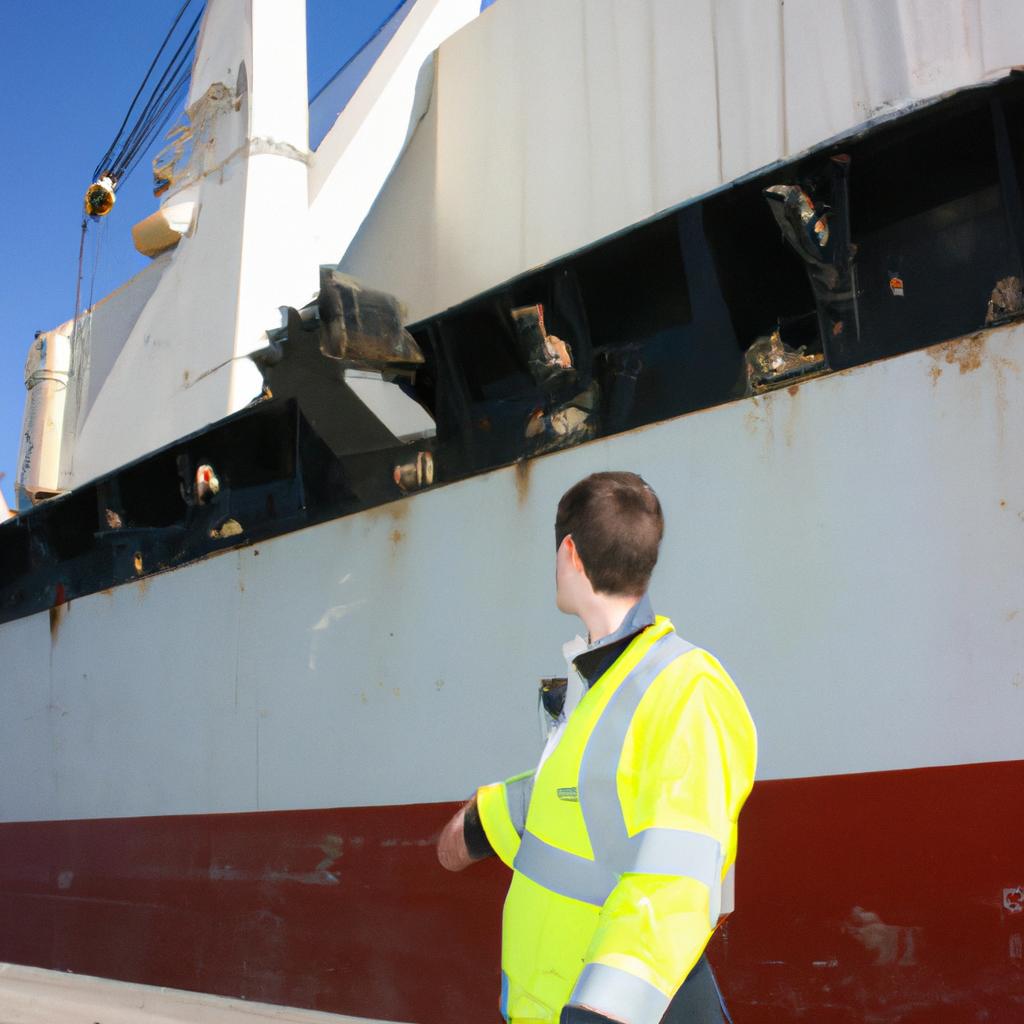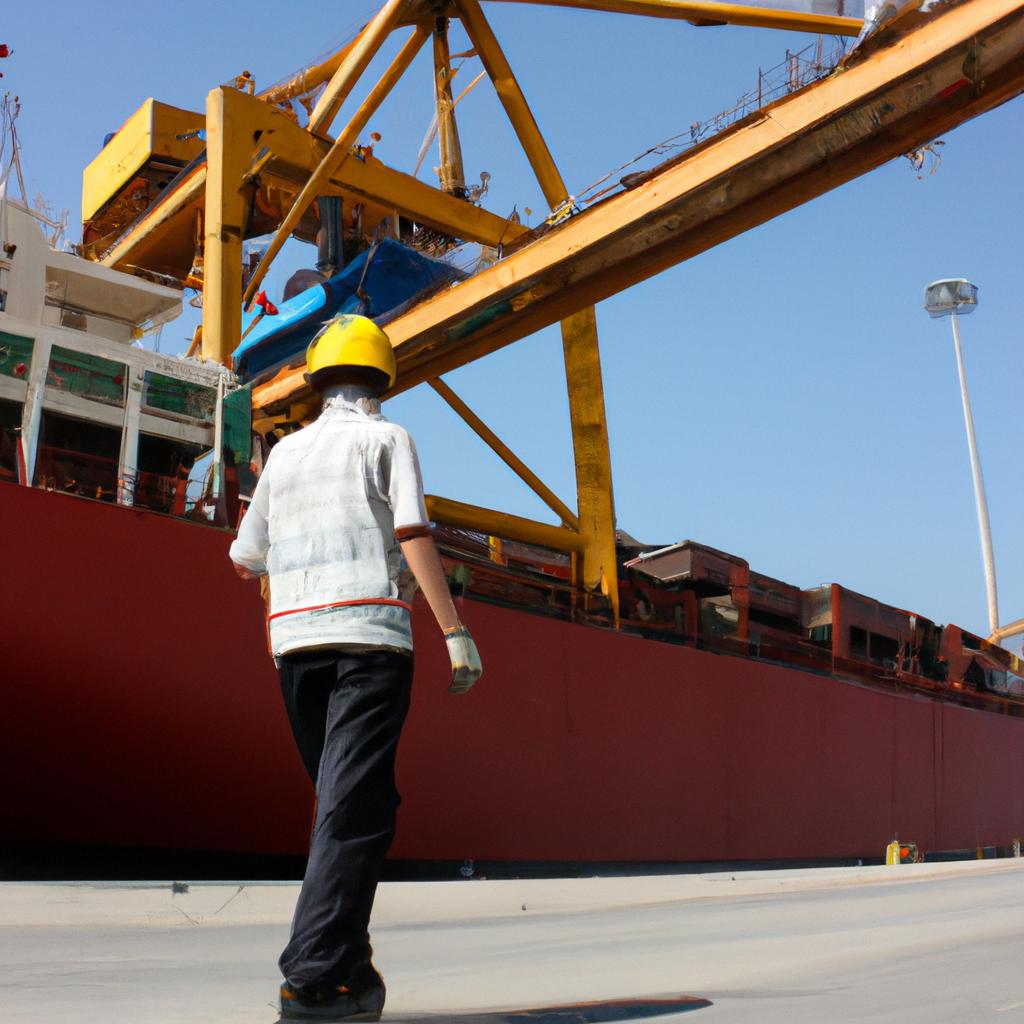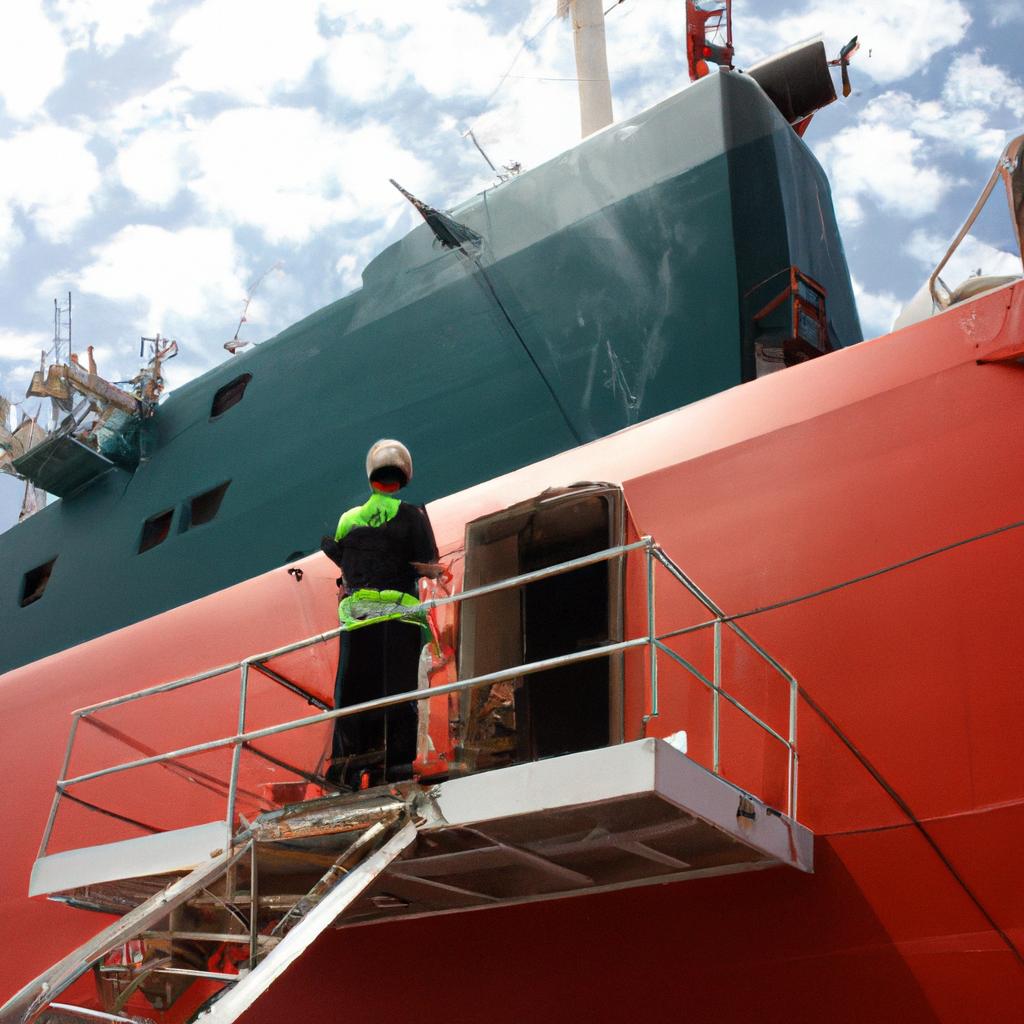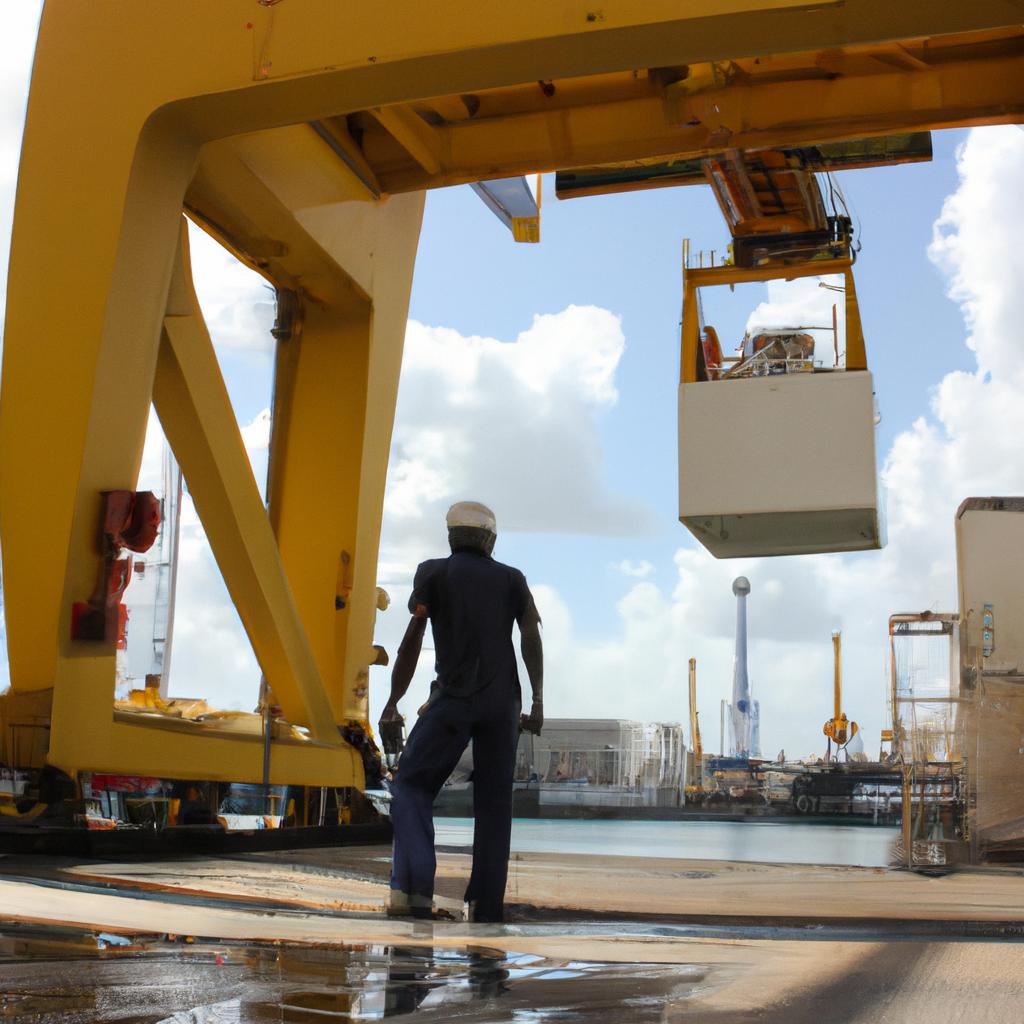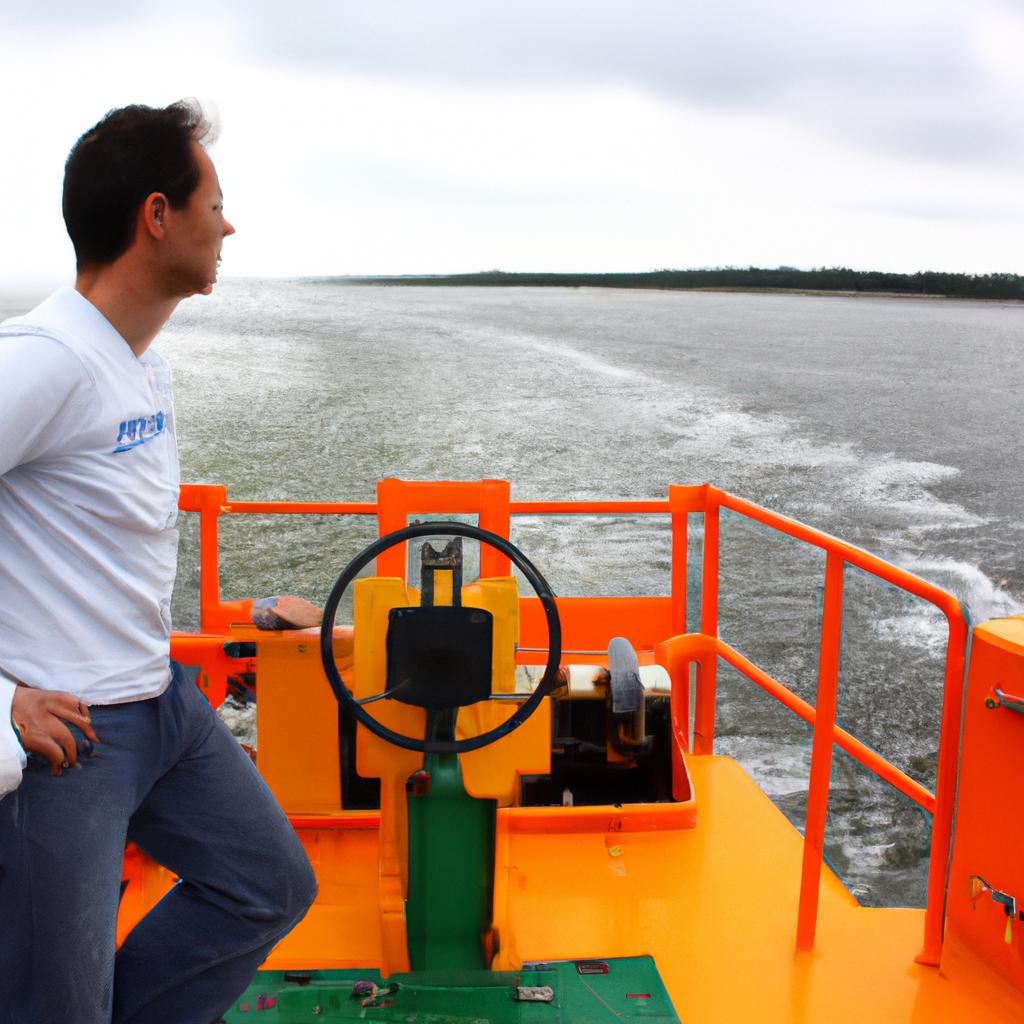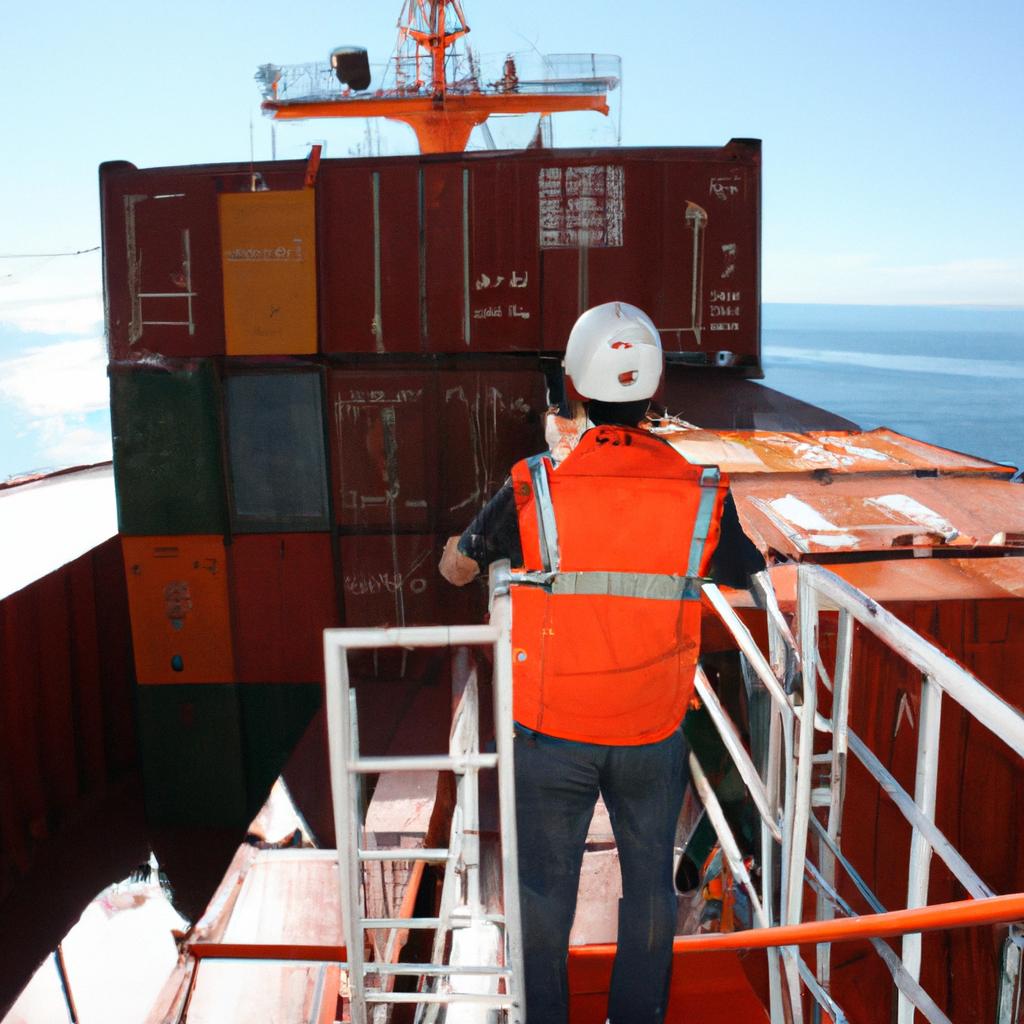In recent years, the Black Sea region has witnessed a significant increase in maritime trade and transportation activities. As shipping companies strive to meet growing demands, ensuring cargo security becomes paramount. The protection of valuable goods during transport is crucial for both economic stability and maintaining trust between trading partners. This article explores the challenges faced by shipping companies operating in the Black Sea region regarding cargo security, as well as strategies and technologies available to mitigate risks.
One notable example that highlights the importance of cargo security is the case of Company X, a leading shipping company based in Constanta, Romania. In 2019, they encountered a major setback when one of their vessels experienced an incident involving stolen cargo worth millions of dollars. This unfortunate event not only caused immense financial losses but also tarnished Company X’s reputation within the industry. Such incidents serve as a stark reminder of the vulnerabilities present within Black Sea transportation and emphasize the need for effective measures to safeguard cargo throughout its journey from origin to destination.
The remainder of this article will delve into various aspects related to cargo security in Black Sea transport, including threats faced by shipping companies, current regulations and best practices implemented to ensure protection, technological advancements aiding in risk mitigation, and future prospects for enhancing cargo security systems. By examining these key areas , stakeholders in the shipping industry can gain a comprehensive understanding of the challenges and solutions associated with cargo security in the Black Sea region.
Threats faced by shipping companies operating in the Black Sea region are varied and multifaceted. These threats include piracy, theft, smuggling, terrorism, and cyber-attacks. The geographical location of the Black Sea, which borders several countries with different political and economic situations, contributes to an increased risk of criminal activities targeting cargo vessels. Furthermore, insufficient law enforcement capabilities and corruption within certain jurisdictions exacerbate these risks.
To address these challenges, both international organizations and national governments have implemented regulations and best practices to enhance cargo security. For example, the International Maritime Organization (IMO) has established guidelines such as the International Ship and Port Facility Security (ISPS) Code that outlines measures for shipowners and port facilities to prevent unauthorized access to vessels or tampering with cargo. Additionally, individual countries in the region have implemented their own regulations to ensure compliance with international standards.
Technological advancements play a crucial role in mitigating risks associated with cargo security. Shipping companies are increasingly utilizing advanced tracking systems that provide real-time monitoring of vessels and their cargoes. These systems utilize satellite technology, GPS trackers, and sensors to track containers’ location, temperature fluctuations, or any unauthorized opening or tampering attempts. Furthermore, modern surveillance technologies such as CCTV cameras and drones are being deployed to enhance situational awareness around ports and onboard vessels.
Looking ahead, there are several prospects for enhancing cargo security systems in the Black Sea region. Collaboration between various stakeholders is key – this includes cooperation between shipping companies, port authorities, law enforcement agencies, governments, and international organizations. Information sharing platforms can be developed to facilitate timely exchange of intelligence regarding potential threats or suspicious activities. Moreover, investment in training programs for personnel involved in cargo handling can contribute to creating a culture of security awareness among all individuals working within the maritime industry.
In conclusion, ensuring cargo security is of utmost importance for shipping companies operating in the Black Sea region. By understanding the challenges, implementing regulations and best practices, harnessing technological advancements, and fostering collaboration among stakeholders, the risks associated with transporting valuable goods can be effectively mitigated. Ultimately, a secure and efficient maritime trade environment will contribute to economic growth and enhance trust between trading partners in the Black Sea region.
Overview of Cargo Security Challenges
To illustrate the challenges faced by shipping companies in ensuring cargo security, let us consider a hypothetical scenario. Imagine a container ship carrying valuable electronic goods departing from the port of Istanbul and heading towards Odessa, Ukraine. During its journey across the Black Sea, the vessel encounters rough weather conditions, resulting in severe damage to several containers and loss of some cargo overboard. This incident highlights just one aspect of the numerous risks that threaten cargo security in the region.
Cargo security in Black Sea transport poses significant challenges for shipping companies due to various factors. Firstly, the geographical location of the Black Sea makes it susceptible to adverse weather conditions such as storms and high winds. These natural hazards not only increase the risk of physical damage to cargo but also contribute to maritime accidents, potentially leading to complete loss or partial damage.
Secondly, piracy remains a concern within this region. The presence of armed groups operating along coastal areas increases the vulnerability of vessels passing through these waters. Pirates often target valuable cargoes, hijack ships for ransom, or engage in acts of sabotage. Such incidents create an atmosphere of fear and insecurity among shipping companies and can result in substantial financial losses.
Thirdly, inadequate infrastructure at ports and lack of efficient customs procedures add further complexity to cargo security issues. Insufficient facilities for inspecting containers thoroughly can lead to cases where contraband materials are smuggled undetected. Similarly, delays caused by inefficient clearance processes can heighten vulnerabilities by prolonging exposure time for potential threats.
Lastly, collusion between corrupt officials and criminal networks exacerbates cargo security challenges in this region. Bribery and illicit practices allow unauthorized access to sensitive information regarding shipments’ routes or contents. This information leakage significantly compromises cargo safety measures and exposes them to theft or diversion during transit.
These challenges necessitate effective strategies to mitigate risks associated with cargo transportation across the Black Sea region. In order to address these concerns adequately:
- Implementing advanced tracking technologies to monitor the movement and location of cargo in real-time.
- Enhancing collaboration between shipping companies, law enforcement agencies, and international organizations to share intelligence and coordinate security efforts.
- Strengthening port infrastructure by investing in modernized inspection systems and facilities for efficient customs procedures.
- Conducting regular training programs for personnel involved in cargo handling to raise awareness about potential security threats.
In light of these challenges, it is essential for shipping companies operating in the Black Sea region to adopt comprehensive measures that ensure the protection of their cargoes. In the subsequent section, we will explore current regulations and international standards that aim to improve cargo security practices.
Current Regulations and International Standards
Cargo Security Challenges in the Black Sea region continue to pose significant risks for shipping companies. One such example is the recent case of a cargo vessel being hijacked by pirates off the coast of Ukraine, resulting in substantial financial losses for the affected company. This incident highlights the need for robust security measures and adherence to international standards to ensure the protection of cargo during transportation.
To address these challenges effectively, it is crucial to consider current regulations and international standards governing cargo security in maritime transport. These frameworks provide guidelines and best practices that shipping companies can adopt to enhance their security protocols. Compliance with these regulations not only minimizes potential vulnerabilities but also ensures consistency across different jurisdictions, making trade operations smoother and more efficient.
In order to maintain high levels of cargo security, there are several key aspects that shipping companies must prioritize:
- Risk assessment: Conducting thorough risk assessments allows shipping companies to identify potential threats and vulnerabilities specific to their operations in the Black Sea region. By understanding these risks, appropriate preventive measures can be implemented proactively.
- Technology utilization: The use of advanced technologies like satellite tracking systems, surveillance cameras, and biometric authentication enhances cargo security by enabling real-time monitoring and detection of any suspicious activities or unauthorized access.
- Training and awareness: Providing comprehensive training programs on cargo security procedures equips personnel with knowledge on identifying potential threats and responding effectively during emergencies.
- Collaboration with stakeholders: Establishing partnerships with relevant stakeholders such as local law enforcement agencies, port authorities, and other industry players fosters information sharing and coordinated efforts towards ensuring cargo security.
Table: Case Study Comparison
| Incident | Location | Consequences |
|---|---|---|
| Piracy Attack | Offshore Ukraine | Financial loss |
| Smuggling | Port Constanta | Legal implications |
| Cybersecurity | Vessel communication | Data breach |
By addressing these challenges head-on and implementing appropriate measures, shipping companies can significantly reduce the risks associated with cargo security in Black Sea transport. The next section will explore risk assessment and mitigation strategies that are crucial in ensuring a comprehensive approach to cargo security.
With an understanding of the current regulations and international standards in place, it is essential now to delve into the process of assessing risks and developing effective strategies for mitigating them.
Risk Assessment and Mitigation Strategies
Cargo security is a critical concern for shipping companies operating in the Black Sea region. In order to ensure the protection of their cargo, it is essential for these companies to implement effective risk assessment and mitigation strategies. This section will discuss various approaches that can be taken to identify potential risks and develop measures to minimize them.
One example of a risk assessment strategy is the use of scenario-based analysis. By simulating different scenarios, such as a pirate attack or a terrorist threat, shipping companies can assess the vulnerabilities of their cargo and develop appropriate countermeasures. For instance, in a hypothetical scenario where pirates attempt to board a vessel, an effective response could involve increasing onboard security personnel, installing surveillance cameras, and implementing access control measures.
To further enhance cargo security, shipping companies should consider adopting international best practices and standards. These standards provide guidelines on various aspects of cargo security, including packaging requirements, container sealing procedures, and documentation protocols. By adhering to these standards, companies can not only reduce the risk of theft or damage but also streamline their operations by ensuring compliance with global regulations.
In addition to regulatory compliance and risk assessment strategies, shipping companies can also employ technology-driven solutions to bolster cargo security. Emerging technologies such as blockchain, artificial intelligence (AI), and Internet of Things (IoT) have shown promise in improving supply chain visibility and enhancing traceability. For instance, AI-powered algorithms can analyze large amounts of data from multiple sources to detect anomalies or suspicious activities in real-time.
In conclusion,
the implementation of robust risk assessment strategies based on realistic scenarios,
adherence to international standards,
and the utilization of emerging technologies
are crucial steps towards ensuring enhanced cargo security for shipping companies operating in the Black Sea region.
Moving forward into exploring “Emerging Technologies for Enhanced Security,” it becomes evident that advancements in technology offer new opportunities for addressing cargo security challenges effectively.
Emerging Technologies for Enhanced Security
Emerging Technologies for Enhanced Security
In recent years, the advancement of technology has played a significant role in enhancing cargo security in Black Sea transport. By adopting emerging technologies, shipping companies have been able to improve their risk assessment and mitigation strategies, ensuring better protection for their valuable shipments. One such example is the implementation of smart containers equipped with innovative tracking systems.
For instance, consider a hypothetical scenario where a shipping company is transporting high-value goods through the Black Sea. With the use of smart containers, these goods can be continuously monitored throughout their journey. The containers are fitted with GPS trackers that provide real-time location updates, enabling shipping companies to closely track their cargo’s movement and promptly detect any deviations from the pre-determined route or unexpected stops. This allows for immediate action to be taken in case of suspicious activities or potential threats.
To further enhance cargo security, here are four key areas where emerging technologies have made significant contributions:
- Surveillance Systems: Advanced surveillance systems incorporating AI-powered video analytics help monitor critical areas within ports and vessels, detecting unusual behavior patterns or unauthorized access.
- Biometric Authentication: Implementing biometric authentication methods such as fingerprint scanning or facial recognition helps ensure secure access control on ships and at port facilities.
- Blockchain Technology: Leveraging blockchain technology enables secure documentation and tamper-proof recordkeeping by creating an immutable ledger accessible only by authorized parties.
- Drone Surveillance: Utilizing drones equipped with cameras and sensors enhances situational awareness by providing aerial views of maritime operations while minimizing human risks.
To showcase how various emerging technologies contribute to enhanced security measures effectively, let us examine them using the following table:
| Emerging Technology | Key Benefits | Application |
|---|---|---|
| Smart Containers | Real-time monitoring | Tracking high-value shipments |
| Advanced Surveillance | Early detection of suspicious activities | Monitoring critical areas |
| Biometric Authentication | Secure access control | Ensuring authorized personnel |
| Blockchain Technology | Tamper-proof recordkeeping | Documenting and sharing data |
| Drone Surveillance | Increased situational awareness | Aerial views of maritime areas |
Incorporating these emerging technologies in cargo security practices not only enhances the protection of shipping companies’ assets but also instills confidence among their clients. As the Black Sea transport industry continues to evolve, collaboration between stakeholders becomes crucial in harnessing the full potential of these advancements for a safer and more secure maritime environment.
Transition into subsequent section: Collaboration between key stakeholders is instrumental in effectively implementing and maximizing the benefits offered by emerging technologies.
Collaboration Between Stakeholders
In recent years, the advancement of technology has played a pivotal role in enhancing cargo security in Black Sea transport. One notable example is the implementation of real-time tracking systems that utilize GPS and satellite communication to monitor the location and movement of cargo vessels. This technological innovation has revolutionized the way shipping companies approach security measures by providing them with accurate and up-to-date information about their shipments.
To further improve cargo security, stakeholders have also embraced the use of unmanned aerial vehicles (UAVs), commonly known as drones. These devices are equipped with high-resolution cameras, thermal imaging sensors, and advanced analytics capabilities, enabling them to conduct aerial surveillance over vast areas quickly and efficiently. By employing UAVs, shipping companies can identify potential security threats such as unauthorized access or suspicious activities near their vessels or ports.
Collaboration between stakeholders is crucial in ensuring effective implementation of these emerging technologies for enhanced cargo security. To achieve this collaboration, it is essential to establish clear lines of communication among government agencies, port authorities, shipping companies, and technology providers. Regular sharing of intelligence and best practices allows all parties involved to stay informed about new risks and countermeasures while fostering a collective effort towards securing maritime transportation.
- Increased visibility: Real-time tracking systems provide shipping companies with increased visibility into their supply chain operations.
- Proactive threat detection: UAVs offer proactive threat detection by conducting regular surveillance over vulnerable areas.
- Rapid response capability: With real-time data from tracking systems combined with drone surveillance footage analysis, rapid responses can be initiated in case of any security breach.
- Cost-effective solutions: The integration of emerging technologies offers cost-effective solutions compared to traditional methods such as manpower-intensive patrolling.
| Technology | Benefits |
|---|---|
| Real-time | Accurate tracking |
| tracking systems | Improved situational awareness |
| Timely response to security incidents | |
| Enhanced supply chain efficiency | |
| UAVs | Aerial surveillance |
| Proactive threat detection | |
| Efficient monitoring of vulnerable areas | |
| Cost-effective alternative to manned patrols |
As the Black Sea transport sector continues to evolve, it is evident that emerging technologies have become integral in bolstering cargo security. By leveraging real-time tracking systems and employing unmanned aerial vehicles for enhanced surveillance, shipping companies can mitigate potential risks more effectively. However, the successful implementation of these technologies heavily relies on collaboration between stakeholders. Through open communication channels and knowledge sharing, a collective effort can be made towards safeguarding maritime transportation.
Moving forward with best practices for cargo security, it is crucial to explore industry guidelines and standards that ensure consistency and effectiveness in securing shipments during their journey.
Best Practices for Cargo Security
Collaboration Between Stakeholders and Best Practices for Cargo Security
In recent years, the Black Sea region has seen a significant increase in maritime trade activities. As shipping companies continue to operate within this dynamic environment, ensuring cargo security becomes paramount to protect their interests. Collaborative efforts among stakeholders play a crucial role in enhancing cargo security measures.
To illustrate the importance of collaboration, consider the case of Company X, one of the largest shipping companies operating in the Black Sea. In an effort to streamline cargo security procedures across different ports, Company X initiated discussions with local authorities, port operators, and other relevant entities. By sharing information and coordinating actions, they were able to establish standardized protocols that enhanced the overall security of goods being transported through various ports. This collaborative approach not only improved efficiency but also served as a deterrent against potential criminal activities targeting cargo shipments.
Effective cargo security practices rely on several key factors:
- Risk assessment: Conducting thorough assessments to identify vulnerabilities and potential threats allows shipping companies to implement targeted preventive measures.
- Technology integration: Utilizing advanced technologies such as electronic seals and tracking systems enables real-time monitoring of cargoes, reducing the risk of theft or tampering during transit.
- Training and awareness: Providing comprehensive training programs for employees involved in cargo handling helps foster awareness about security risks and promotes best practices throughout the supply chain.
- Information sharing: Establishing efficient communication channels between all stakeholders facilitates timely exchange of intelligence related to emerging threats or suspicious activities.
| Potential Risks | Preventive Measures | Benefits |
|---|---|---|
| Unauthorized access | Enhanced perimeter security | Reduced instances of unauthorized access |
| Tampering | Use of tamper-evident packaging | Increased confidence in cargo integrity |
| Cybersecurity breaches | Regular system audits | Protection against data breaches |
| Insider threats | Implementing strict access controls | Mitigation of internal risks |
As illustrated in the table above, implementing preventive measures can yield numerous benefits, ranging from reduced instances of unauthorized access to increased confidence in cargo integrity. By addressing potential risks proactively and collaboratively, shipping companies operating within the Black Sea region can safeguard their cargo and maintain a secure environment for trade.
In conclusion, collaboration between stakeholders is fundamental to enhancing cargo security in Black Sea transport. Through effective risk assessment, technology integration, training programs, and information sharing practices, shipping companies can mitigate vulnerabilities and protect valuable goods from various security threats. By embracing these best practices collectively, all parties involved contribute to creating a safer maritime landscape that fosters trust and sustainable growth for the entire industry.

